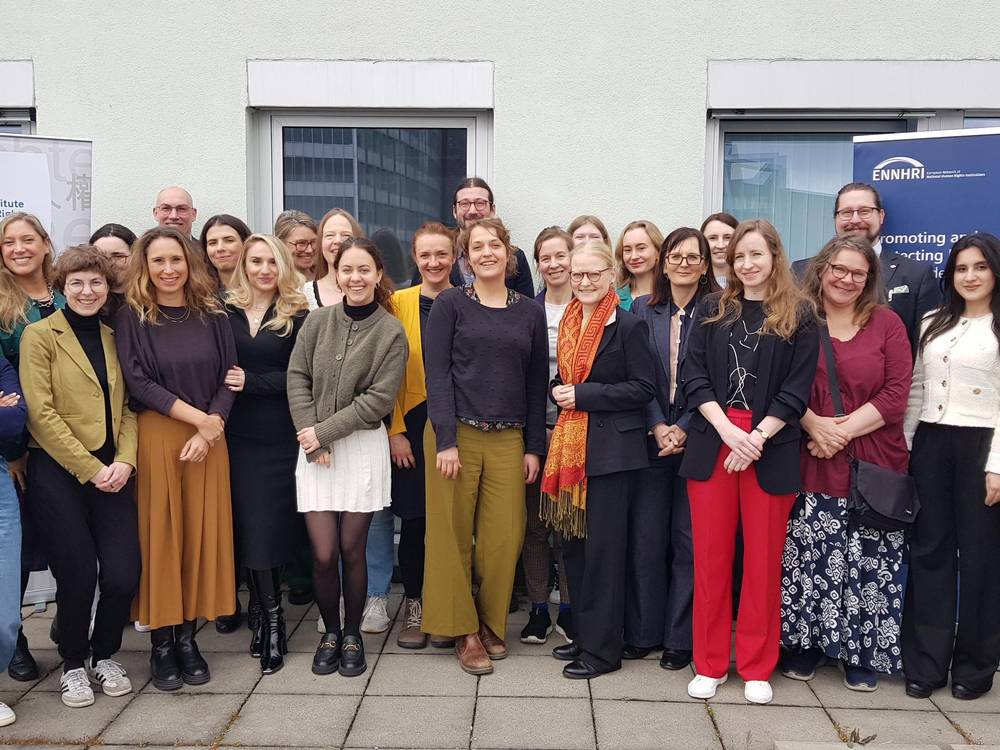A two-day meeting of the Working Group on the Rights of Persons with Disabilities, which operates within the European Network of National Human Rights Institutions (ENNHRI) took place in Berlin, Germany, on 31 March and 1 April 2025. The event was organized in cooperation with the German Institute for Human Rights by Jerneja Turin, Advisor at the Human Rights Centre of the Ombudsman of the Republic of Slovenia (Ombudsman), who is the Chair of the Working Group of the aforementioned network..
The event brought together representatives of European National Human Rights Institutions (NHRIs) and independent mechanisms for monitoring the implementation of the United Nations Convention on the Rights of Persons with Disabilities (CRPD). Over two days, participants exchanged experiences and good practices in the field of promoting, protecting, and monitoring the rights of persons with disabilities. Representatives of regional partners, namely the European Union Agency for Fundamental Rights and the European Disability Forum, also participated in the meeting.
Presentations and discussions focused on some key and challenging issues in the field of human rights of persons with disabilities, such as legal capacity and guardianship, deinstitutionalisation, the impact of austerity policies on monitoring the implementation of the CRPD, and methodologies for the effective implementation of the mandates of national institutions and independent monitoring mechanisms.
Jerneja Turin, who chaired the meeting, also presented an analysis of how independent monitoring mechanisms for the implementation of the CRPD are organised in European national human rights institutions. She highlighted in particular how these mechanisms involve the participation of persons with disabilities and their representative organisations, how they implement their mandates, and what capacities they have to operate effectively.
Such events are a valuable reminder of the importance of face-to-face meetings, sharing practices, listening to each other, and learning from one another. The participants found the meeting extremely useful and successful, which further confirms the importance of networking and cooperation in realising the rights of persons with disabilities.
The ENNHRI Working Group on the Rights of Persons with Disabilities brings together 39 national human rights institutions and 13 observers. These include the EU Agency for Fundamental Rights, the European Parliament, the European Disability Forum, the Council of Europe Commissioner for Human Rights, the Office of the UN High Commissioner for Human Rights, the Equinet network, and six equality bodies and independent monitoring mechanisms of the CRPD that are not NHRIs.
The main objective of the Working Group is to strengthen the capacity of national human rights institutions to protect the rights of persons with disabilities and to promote closer cooperation between national, regional, and international stakeholders. The Group focuses on mutual exchange of knowledge and experience, and ultimately on practical aspects of monitoring the implementation of the rights of persons with disabilities within the framework of its mandates. During the chairmanship of the Working Group, the Ombudsman’s representative Jerneja Turin, in addition to regular meetings, also organised a webinar on monitoring the compliance of the use of EU funds with the obligations under the CRPD, at which experts and members of the Group discussed the role of national institutions in this process. It also organised a webinar on artificial intelligence and its impact on the rights of persons with disabilities. The discussion addressed both the opportunities and risks posed by artificial intelligence, and highlighted the important role of national institutions in ensuring that technological progress respects human rights. Following the seminar, the group prepared a joint statement for the Conference of the Parties to the CRPD, highlighting key concerns and opportunities. In addition to the thematic initiatives, the Working Group is also active in strengthening cooperation with regional and global partners and maintains a regular dialogue with the EU framework for monitoring the implementation of the CRPD. The Ombudsman prepares a quarterly newsletter for the Working Group on the activities of its members and partners, regularly providing members with key information on developments in the field of the rights of persons with disabilities. The newsletter is available on the ENNHRI website — see the section Newsletters.

![[Translate to English:] Udeleženci srečanja delovne skupine ENNHRI](/fileadmin/_processed_/e/9/csm_CRPD_WG_meeting_Berlin_31._3._2025_-_Copy_GIHR_7e8f2b0e74.jpg)